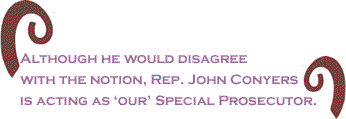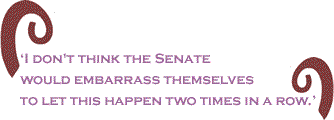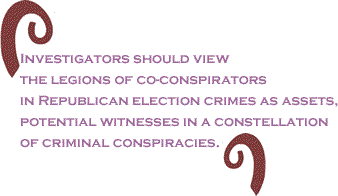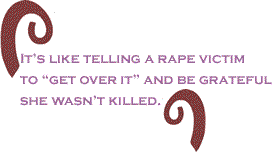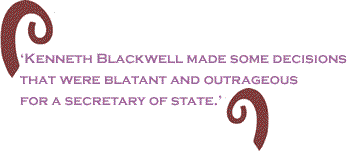
|
|||||||||||||||||||||
 |
|||||||||||||||||||||
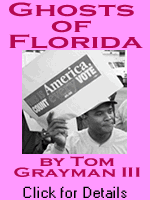 |
|||||||||||||||||||||
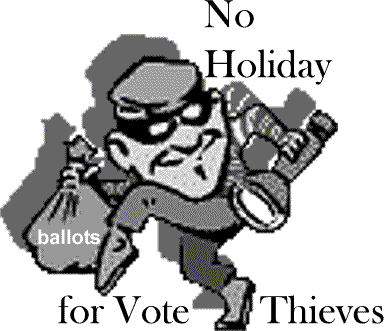 |
|
The Dean of the Congressional Black Caucus is confident that at least a few U.S. Senators will join House members on January 6 to question the fairness of the November 2 election. John Conyers, Jr., the ranking Democrat on the House Judiciary Committee, told Salon.com he doesn’t believe the Senate will repeat its performance of four years ago, when Black lawmakers sought in vain for one senatorial objection to “official misconduct, deliberate fraud, and an attempt to suppress voter turnout by unlawful means” in Florida, as Congressman Alcee Hastings (D-FL) put it at the time. “No, I think the Senate is going to go along with an inquiry this time,” said Conyers. “I don't think they would embarrass themselves to let this happen two times in a row… I just don't think the Senate would get caught in that position.” Conyers is careful not to name names, claiming he hasn’t spoken directly to a single Senator, but adding, “there are Republicans who support what I'm doing who haven't been willing to come forward.” Conyers is the indispensable person among the righteous Grinches who are casting a shadow over the Republicans’ holiday. Through his hearings in the Capitol and Ohio – unsanctioned and unattended by Republicans – and his engagement of the Government Accountability Office to study election “irregularities,” the 75-year-old Detroit lawmaker has thrown an institutional spotlight on GOP crimes and misdemeanors. How “high” these crimes can be connected is another story, but there is no doubt that massive violations of a variety of laws occurred on the ground. Conyers prefers to call them “things that went wrong” in swing states like Ohio:
Conspiracy? Conyers understandably avoids using a word that corporate media so eagerly associate with nut cases. Instead, Conyers employs a less loaded term:
But conspiracies do exist; they occur every time a group of persons plans to commit criminal acts. Conyers knows this. He’s not only a lawyer, he’s a Watergate lawyer, having sat on the same Judiciary Committee that saw Richard Nixon’s presidency unravel in 1973-74. District attorneys in big cities across the nation love conspiracy law, designed to connect the seemingly random depredations of criminal gangs. Conspirators can be convicted even if they don’t know all the other players or the whole scope of the criminal enterprise. They need only be shown to have acted in the furtherance of the larger scheme.
Sounds very much like Rep. Conyers’ “orchestrated attempts,” doesn’t it? To catch a vote thief A prosecutor like Rudy Giuliani would have a field day with the GOP’s myriad 2004 criminal offenses. Just a few examples:
Those who act in concert with others to violate the Voting Rights Act or related laws (such as the National Voter Registration Act, in the box below) should be confronted with the prospect of conspiracy charges in addition to criminal penalties (prison time) for individual offenses. That’s the way gangsters are brought down, every day.
Thousands of perps The
“dozens of problems” of which Rep. Conyers speaks are actually
hundreds of specific criminal offenses involving perhaps thousands
of persons acting with large or small groups of others in Ohio
and Florida, alone. Investigators should view the legions of co-conspirators
in Republican We have purposely not dwelt in this article on the mega-crimes whose outlines became apparent in statistical analyses of the exit polls vs. tabulated votes in “battleground” and other states, or damning variances in results depending on modes of vote counting – the hawk’s eye view of the crime. (On Wednesday, Rep. Conyers called on news organizations to provide his committee with raw exit poll data, rather than the numbers that were “adjusted” to conform to the official vote tallies.) What has too often been lost in the conversations surrounding the 2000 and 2004 elections, is the fact that laws already in existence have been violated.
In every other arena of criminal justice it is standard procedure to entangle suspected perpetrators in their own lies, and in the lies of their co-conspirators. Yet somehow, this practice does not obtain when Black voting rights are criminally violated. It is as if no crime has been committed, at all, just mere voting “irregularities.” “Get over it,” say the corporate media. Concentrate your energies on “reforms” from the next Congress, or the one after that, say others, including some people who claim to be “progressive.” Such responses are maddening, outrageously racist at their very core, the product of a profoundly Jim Crow worldview that denies African Americans their full measure of dignity as human beings, that treats our victimization as a matter of course whose resolution – but never redress – can always be put off to another, more convenient day. To paraphrase the infamous U.S. Supreme Court Chief Justice Taney’s 1857 Dred Scott decision: “African American voters have no rights that the larger society is bound to protect.” It is these rights that are at issue, Black human and citizenship rights. The outcome of the presidential election is secondary. Hostility to Black citizenship
It has been suggested that violations of Black voting rights are treated lightly by media, prosecutors and predominant white public opinion because of the “white collar” nature of the crimes. Not so. As with all aspects of criminal justice in the United States, race is the primary prosecutorial and political determinant. With a zealotry that spans seven generations, from Reconstruction to the present, yesteryear’s Dixiecrats and today’s Republicans have succeeded in firmly linking the words “Black” and “vote fraud” in the public mind. This historical/mythological association is the rationale for the now-routine invasion of Black polling places by hordes of GOP “observers” – whose real mission is voter intimidation. Registering-voters-while-Black has long been a crime in Dixie. Alabama and federal lawmen spent four years, beginning in 1995, prosecuting Black Belt electoral activists for alleged absentee ballot fraud. The November 15, 1999 issue of The Nation recounts:
Confronting the full weight of the state and federal governments, nine African Americans ultimately pleaded guilty to fraud charges in 1999. According to The Nation article, the feds were much more lenient with North Carolina Republican Senator Jesse Helms who, while “trailing a black opponent in 1990, mailed out postcards to 125,000 black voters implicitly threatening them with jail if they went to the polls. Helms's campaign settled a complaint with the Justice Department in 1992, but not before he had won another term.” Ain’t a damn thing changed in the 21st Century. As columnist Bob Herbert reported in the New York Times this past August, Florida Governor Jeb Bush’s State Police targeted Black, mostly elderly members of the Orlando League of Voters on “suspicion” of absentee ballot vote fraud. Joseph Egan, an Orlando lawyer who represented some of activists on the state’s hit list, told Herbert: "People who have voted by absentee ballot for years are refusing to allow campaign workers to come to their homes. And volunteers who have participated for years in assisting people, particularly the elderly or handicapped, are scared and don't want to risk a criminal investigation." No, vote fraud is only treated as a white collar infraction – an “irregularity” – when the alleged perpetrators are white. The truth is, somewhere around a majority of whites
don’t really think African Americans should have an unqualified
right to vote – although very few will say so, and most may be
unaware of their constricted views of Black rights. This is the
(Close to half of Americans don’t think Muslims should have full citizenship rights, either. A Cornell University poll found that 44 percent of respondents favor some degree of curtailment of Muslim Americans' rights, including 27 percent who say Muslims should be required to register their locations with the federal government. These are undoubtedly the same people who believe Democrats fabricated all those stories about abuse of Black voters in Florida.)
Thus, the corporate media may be more reflective of than responsible for the widespread demand that African Americans “get over” the events of the last two presidential elections. Recounts and investigations of systematic Black voter suppression are made to seem ridiculous if the results do not alter the outcome. By such reasoning, it would not matter if all the Black voters of Alabama and Mississippi were turned away from the polls, since whites were going to give George Bush the electoral votes of those states, anyway. Crimes against Black citizenship do not matter unless it can be proven that the election was tipped in the process (or maybe not even then). Television news personalities smirk while presenting election protest items, conveying the message: “You lost. Why don’t you people quit?” As if the harm done to untold numbers of Black citizens is of no consequence. It’s like telling a rape victim to “get over it” and be grateful she wasn’t killed. This pervasive mindset also infects elements of the white “left.” Greg Moses, editor of the Texas Civil Rights Review, calls it “type two racism” – the dogged insistence on disconnecting race and racism from election crimes:
Serious business Given the hostile backdrop, post-November 2 protesters, investigators, litigators, agitators and fundraisers are nothing less than heroic. Although he would disagree with the notion, Rep. Conyers is acting as “our” Special Prosecutor, methodically laying the factual groundwork for future legal and political action while at the same time giving the “troops” a central focus around which to orbit.
Already a congressman for nearly a decade when the Watergate hearings began in May 1973, Conyers is a long-haul legislator and lawyer who understands the critical importance of documentation. “I ask and invite everybody to turn in any evidence that they want that helps prove whatever position they believe, or even a position they don't believe,” he told Salon.com. “But this isn't a hunch and suspicion game. This is very serious business.” The arrogant and shameless Ohio Secretary of State, Kenneth Blackwell, who refused an invitation to appear before Conyers’ hearings, has earned his place at the nexus of the investigation. “I know that Kenneth Blackwell made some decisions that were blatant and outrageous for a secretary of state,” said Conyers. “How he felt that his head was big enough to be chairman of the ‘Re-elect Bush’ committee and also head of the administration of the electoral vote for the president in that same state was beyond me. … There are very few people who did what he did.” Conyers’ December 2 letter to Blackwell reads much like a prosecutor’s document. For example:
We think Conyers smells conspiracies, or at least some very nasty “orchestrated attempts” to break the law. Without Conyers’ clear determination to press forward with hearings, it is doubtful that the “movement” (if it can called that) to lay bare the facts of November 2 could have been sustained, to this point. There might have been no national “scene of the crime” rally in Columbus, Ohio, scheduled for January 3; no growing list of Electoral College Electors demanding, for the first time in history, a “complete investigation”; and little prospect of even one senator standing with the Congressional Black Caucus on January 6, when the body meets to certify the Electoral College vote. And no possibility, however remote, of anyone going to jail for the crimes of November 2. Absent relentless agitation, litigation and investigation of the past election, Congressman Jesse Jackson, Jr.’s constitutional amendment guaranteeing the right to vote will come to naught, as will every other effort at meaningful election reform. Rich man’s dream Hawking his Social Security personal savings accounts, George Bush this week attempted to explain his vision of an “ownership society,” stammering: “One of the philosophies of this government is if you own something, it is – it makes the country a better – if more people own something, the country is better off; you have a stake in the future of the country if you own something.” Political translation: The best society is one in which those who own, rule. This was in fact a core belief of the Founding Fathers, who created a system in which a very tiny cohort of white men with property held all political power. In a brief but brilliant 1994 essay, “Democracy Was Not What They Had On Their Minds,” Marquita Hill points out that only 30,000 voters – less than 1% of the population – participated in the presidential election of 1796 in which John Adams defeated Thomas Jefferson. Only about 112,000 citizens took part in the 1804 election, out of a total population of more than six million! “Total votes didn't top a million until Native American killer Andrew Jackson's defeat of John Quincy Adams in 1828,” Ms Hill wrote. By then, the U.S. population was approaching 12 million. Hill concludes: “Handfuls of white, male propertied voters established the precedent that only their kind would sit in the White House.” This was the intention of the Founders who launched the nation on its rule-by-the-white-rich trajectory. Our struggle is to force that trajectory to “bend toward justice.” |
|
| December 23 2004 Issue 119 |
|||||||||
|
|||||||||
|
|
|||||||||
| Printer Friendly Version | |||||||||
 |
|||||||||
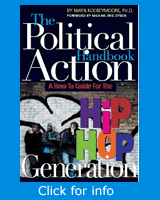 |
|||||||||
 |
|||||||||
| |
|||||||||
| |
|||||||||





















